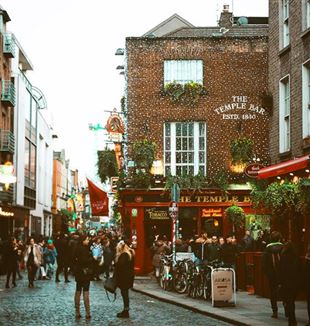
Dublin: “Only Christ can fill my life”
The health crisis has paralyzed his language school. An employee asks him, "How can you wake up in the morning not knowing if it is going to end well?" To answer, Mauro remembers the time when he and Margaret slept on a bench…Thirty-four years ago, I opened a language school in Dublin. We had to close because of the health crisis and, to date, we have still not been able to reopen, either because of government restrictions or because of the international conditions upon which a society like ours is totally dependent. There is still a lot of uncertainty about the conditions under which the school will be able to restart. Our whole sector is in serious crisis and our school, like others, is fighting for survival.
Before the lockdown, we had one hundred employees. Now we only have 18. The others receive help from the government. I have never worked so hard: every morning I get up and try to find solutions, but I still do not know if or how everything we have built will come out of the crisis unscathed.
I remember that at the beginning of this period of crisis, I had listened again to the Gospel episode about the man born blind. The disciples ask: "Who sinned, this man or his parents?” And Jesus answers: "Neither he nor his parents sinned; it is so that the works of God might be made visible through him.” Since then, this has been the common thread that has bound my days: in this situation, where can we see His presence? Hence a position not of complaint but of desire and curiosity to see how the Glory of Christ manifests itself within each challenge, each decision to make and whether or not solutions can be found.
In a dialogue, a colleague confided to me their fear about what awaits us. In such a conversation, the ultimate question of life clearly emerges. She asked me: "How can you wake up in the morning and come to work if we do not know if it will end well?” I was surprised to answer that the problem is not to find a valid reason for an uncertain future, but to perceive what has sustained us so far, and to understand if it is enough to face the present challenges. What do I need now?
On Saturday June 13, my wife Margaret and I followed the Macerata-Loreto Pilgrimage online. We had done it once together, in 1984. A lifetime ago. We were not married yet. I was in the army in Ancona, she was studying in Rome. We did not know what would become of us: where we would live, what job we would do, what our life would be like. After the end of the Pilgrimage, we found ourselves in Ancona without a place to stay and we slept on a bench in front of the Cathedral, like poor people. And yet we were not frightened, we fell asleep peacefully: all we needed was the consciousness of having abandoned ourselves into Jesus’ arms, through Our Lady. Today, although uncertain about the future, we find ourselves in the same situation, but with many more responsibilities (our decisions have consequences for the lives of many people). And yet, in these years, we have seen that this abandonment pays off. The energy to live through difficulties does not come from the certainty of a positive result, but from rediscovering that position of abandonment. The fear of uncertainty is not taken away, but you have the courage to enter into the difficulties. The Pope's quotation of St. Augustine a few weeks ago has helped me a lot: "I am afraid of not being aware that it is Christ, and letting Him pass by.” The most evident fruit of this position is that I can come home in the evening after a hard day and even if I am afraid and tired I can ultimately be happy, rather than disoriented and suffocated by uncertainty.
Another thing has struck me during these months. Here in Ireland, like everyone else, we have started doing School of Community online. Not only with people in Dublin, but also with people in other cities: Limerick, Galway, Cork. I have never seen such loyalty. But what has impressed me the most is that the latest newcomer, who had started coming right at the beginning of lockdown, said that she had found a companionship in us that supported her and that we had become her friends. A friend, who has been in the community for many years, confided to me: "But how can she say that, if we have never seen each other in person?" I think it is a great provocation, which makes us understand what our friendship really is. Precisely in these circumstances, I am understanding better what Carrón means when he says that "the companionship is in the I". We usually think that companionship is the sense of belonging to a group, whilst it is born from the consciousness of the infinite need that we are, which binds us in an indissoluble way to the Mystery. Really being friends has something to do with this.
Read also – Crossing the divide
I am 62 years old, the energy to fight is starting to run out. Is it time to hang up my boots? I do not know what is waiting for me. But I am certain of one thing: what is not reduced is this fear that Christ will pass by and I will not notice Him. Even if everything were to be taken away from me, I know that Christ passes through my life. I get up in the morning and go to work with this anxiety. That is why I can ask others to do the same: because only Christ can fill my life.
Mauro, Dublin, Ireland